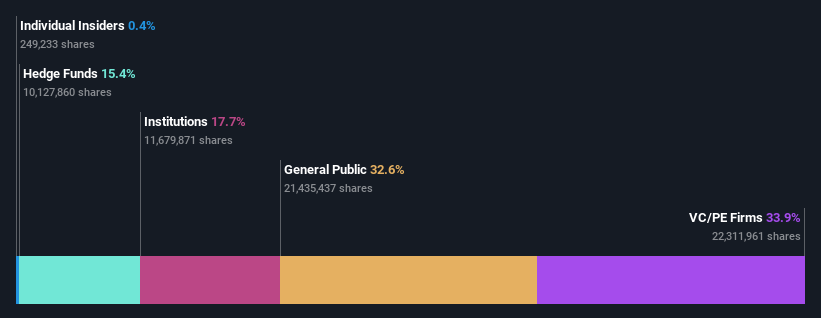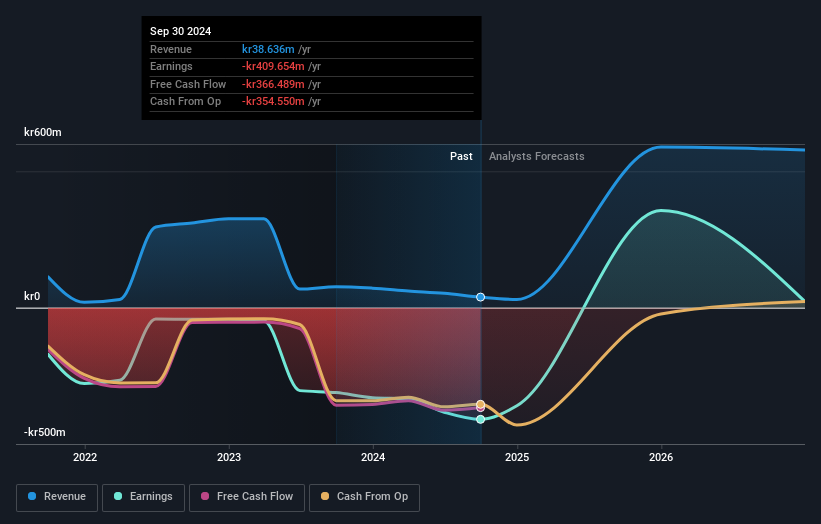Private equity firms among BioInvent International AB (publ)'s (STO:BINV) largest stockholders and were hit after last week's 23% price drop

Key Insights
- The considerable ownership by private equity firms in BioInvent International indicates that they collectively have a greater say in management and business strategy
- The top 6 shareholders own 55% of the company
- Institutional ownership in BioInvent International is 18%
If you want to know who really controls BioInvent International AB (publ) (STO:BINV), then you'll have to look at the makeup of its share registry. And the group that holds the biggest piece of the pie are private equity firms with 34% ownership. In other words, the group stands to gain the most (or lose the most) from their investment into the company.
As market cap fell to kr2.1b last week, private equity firms would have faced the highest losses than any other shareholder groups of the company.
Let's take a closer look to see what the different types of shareholders can tell us about BioInvent International.
View our latest analysis for BioInvent International

What Does The Institutional Ownership Tell Us About BioInvent International?
Institutional investors commonly compare their own returns to the returns of a commonly followed index. So they generally do consider buying larger companies that are included in the relevant benchmark index.
We can see that BioInvent International does have institutional investors; and they hold a good portion of the company's stock. This suggests some credibility amongst professional investors. But we can't rely on that fact alone since institutions make bad investments sometimes, just like everyone does. If multiple institutions change their view on a stock at the same time, you could see the share price drop fast. It's therefore worth looking at BioInvent International's earnings history below. Of course, the future is what really matters.

It looks like hedge funds own 15% of BioInvent International shares. That's interesting, because hedge funds can be quite active and activist. Many look for medium term catalysts that will drive the share price higher. The company's largest shareholder is Redmile Group, LLC, with ownership of 15%. Meanwhile, the second and third largest shareholders, hold 10% and 9.8%, of the shares outstanding, respectively.
We also observed that the top 6 shareholders account for more than half of the share register, with a few smaller shareholders to balance the interests of the larger ones to a certain extent.
Researching institutional ownership is a good way to gauge and filter a stock's expected performance. The same can be achieved by studying analyst sentiments. There is a little analyst coverage of the stock, but not much. So there is room for it to gain more coverage.
Insider Ownership Of BioInvent International
The definition of an insider can differ slightly between different countries, but members of the board of directors always count. Company management run the business, but the CEO will answer to the board, even if he or she is a member of it.
Most consider insider ownership a positive because it can indicate the board is well aligned with other shareholders. However, on some occasions too much power is concentrated within this group.
Our information suggests that BioInvent International AB (publ) insiders own under 1% of the company. It appears that the board holds about kr7.9m worth of stock. This compares to a market capitalization of kr2.1b. Many tend to prefer to see a board with bigger shareholdings. A good next step might be to take a look at this free summary of insider buying and selling.
General Public Ownership
The general public-- including retail investors -- own 33% stake in the company, and hence can't easily be ignored. While this size of ownership may not be enough to sway a policy decision in their favour, they can still make a collective impact on company policies.
Private Equity Ownership
Private equity firms hold a 34% stake in BioInvent International. This suggests they can be influential in key policy decisions. Some investors might be encouraged by this, since private equity are sometimes able to encourage strategies that help the market see the value in the company. Alternatively, those holders might be exiting the investment after taking it public.
Next Steps:
While it is well worth considering the different groups that own a company, there are other factors that are even more important. Case in point: We've spotted 1 warning sign for BioInvent International you should be aware of.
Ultimately the future is most important. You can access this free report on analyst forecasts for the company.
NB: Figures in this article are calculated using data from the last twelve months, which refer to the 12-month period ending on the last date of the month the financial statement is dated. This may not be consistent with full year annual report figures.
Valuation is complex, but we're here to simplify it.
Discover if BioInvent International might be undervalued or overvalued with our detailed analysis, featuring fair value estimates, potential risks, dividends, insider trades, and its financial condition.
Access Free AnalysisHave feedback on this article? Concerned about the content? Get in touch with us directly. Alternatively, email editorial-team (at) simplywallst.com.
This article by Simply Wall St is general in nature. We provide commentary based on historical data and analyst forecasts only using an unbiased methodology and our articles are not intended to be financial advice. It does not constitute a recommendation to buy or sell any stock, and does not take account of your objectives, or your financial situation. We aim to bring you long-term focused analysis driven by fundamental data. Note that our analysis may not factor in the latest price-sensitive company announcements or qualitative material. Simply Wall St has no position in any stocks mentioned.
About OM:BINV
BioInvent International
A clinical-stage company, discovers, researches, and develops novel immuno-modulatory antibodies for the treatment of cancer in Sweden, Europe, the United States, and internationally.
Flawless balance sheet with high growth potential.
Market Insights
Community Narratives




